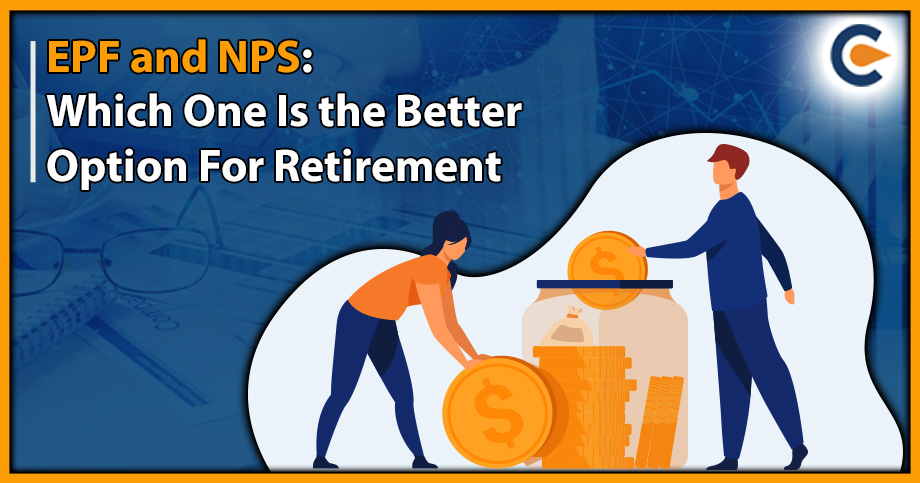Retirement planning is crucial for every individual, and choosing the right retirement savings plan is an important decision. In India, two of the most popular retirement savings options are the Employee Provident Fund (EPF) and the National Pension System (NPS). Both the EPF and NPS are government-backed retirement savings schemes that offer tax benefits and help individuals accumulate savings for their retirement years. In this blog, we will compare the EPF and NPS and help you understand which one is a better option for your retirement.
What is EPF and NPS?
Lets discuss the meaning of EPF and NPS:
Employee Provident Fund (EPF)
The Employee Provident Fund (EPF) is a retirement savings scheme that is regulated by the Employees’ Provident Fund Organisation (EPFO). The scheme is available to employees of organisations with more than 20 employees and requires both the employee and the employer to make monthly contributions. The contributions made to the EPF are invested in a range of fixed-income instruments, including government bonds, and the scheme provides a guaranteed rate of return.
- Benefits of EPF: Some
of the benefits of EPF are as follows:
- Guaranteed Returns – The EPF offers a guaranteed rate of return, which is decided by the government every year. The current rate of return for the EPF is 8.5% per annum.
- Tax Benefits – The contributions made to the EPF are tax-deductible under Section 80C of the Income Tax Act, and the interest earned on the EPF is tax-free.
- Easy to Manage – The EPF is a simple and easy-to-manage retirement savings option, as the contributions are automatically deducted from the employee’s salary and deposited into the EPF account.
- Portability – The EPF account can be easily transferred from one employer to another, making it a convenient option for employees who frequently change jobs.
National Pension System (NPS)
The National Pension System (NPS) is a voluntary, defined contribution retirement savings scheme that is regulated by the Pension Fund Regulatory & Development Authority[1] (PFRDA). The scheme is open to all citizens of India, including self-employed individuals, and requires regular contributions from the subscriber. The contributions made to the NPS are invested in a range of asset classes, including equities, government bonds, and corporate bonds, and the returns on the investments are market-linked.
- Benefits of NPS: Benefits
of NPS are explained in the following:
- Market-linked Returns – The NPS offers market-linked returns, which means that the returns on the investments are based on the performance of the underlying assets. This makes the NPS a potentially higher-return retirement savings option than the EPF.
- Tax Benefits – The contributions made to the NPS are tax-deductible under Section 80C of the Income Tax Act, and an additional deduction of up to Rs. 50,000 is available under Section 80CCD(1B). The withdrawal of the NPS corpus is also tax-exempt up to a certain limit.
- Flexibility – The NPS offers flexibility in terms of investment choice and contribution amount. Subscribers can choose between three investment options – equity, corporate debt, and government securities – and can switch between the options as per their investment objectives. Additionally, the contribution amount can be varied during the tenure of the scheme.
- Retirement Income – The NPS offers the option of a regular income in the form of an annuity after retirement. This ensures that the subscriber has a steady source of income during their retirement years.
Management Fees and Charges – EPF and NPS
The EPF does not have any management fees or charges, as the scheme is managed by the government. However, the NPS has certain management fees and charges associated with it, which can vary based on the investment option chosen by the subscriber. For instance, the active choice option of the NPS has a higher management fee compared to the auto choice option.
Eligibility Criteria and Documentation for EPF and NPS
The EPF is applicable to all salaried employees, and the employer is required to make contributions on behalf of the employee. The NPS, on the other hand, is applicable to all citizens of India between the ages of 18 and 65. The subscriber has to open an account with a PFM and make contributions on their own. In terms of documentation, the EPF requires a universal account number (UAN) to be created for each employee, while the NPS requires the subscriber to submit certain KYC documents such as PAN card, Aadhaar card, and address proof.
Comparison Between EPF and NPS
Now that we have discussed the benefits of both the EPF and NPS, let’s compare the two retirement savings options.
- Returns – The EPF offers a guaranteed rate of return, which is currently 8.5% per annum. On the other hand, the returns on the NPS are market-linked, which means that the returns can be higher or lower depending on the performance of the underlying assets. While the potential for higher returns is greater with the NPS, the guaranteed return offered by the EPF can provide a sense of security to risk-averse investors.
- Investment Choice – The EPF invests only in fixed-income instruments such as government bonds, while the NPS offers subscribers the choice of investing in equity, corporate debt, and government securities. The investment choice offered by the NPS allows investors to diversify their portfolio and potentially earn higher returns.
- Tax Benefits – Both the EPF and NPS offer tax benefits. The contributions made to both schemes are tax-deductible under Section 80C of the Income Tax Act. However, the NPS offers an additional tax deduction of up to Rs. 50,000 under Section 80CCD(1B), which is not available with the EPF. Additionally, the withdrawal of the NPS corpus is also tax-exempt up to a certain limit.
- Flexibility – The NPS offers subscribers the flexibility to choose between different investment options and change their investment allocation as per their investment objectives. Additionally, the contribution amount can be varied during the tenure of the scheme. The EPF, on the other hand, offers little flexibility in terms of investment choice or contribution amount.
- Annuity Option – The NPS offers the option of a regular income in the form of an annuity after retirement. This ensures that the subscriber has a steady source of income during their retirement years. The EPF, however, does not offer any such option and the subscriber has to withdraw the entire corpus at once.
Conclusion
Both the EPF and NPS are excellent retirement savings options in India. While the EPF offers a guaranteed rate of return and is easy to manage, the NPS offers the potential for higher returns, investment choice, and flexibility. Both schemes provide tax benefits and can help individuals accumulate savings for their retirement years. Ultimately, the choice between EPF and NPS will depend on an individual’s investment objectives, risk tolerance, and financial goals. For those who prefer a low-risk investment option with guaranteed returns, EPF is an ideal choice. However, if one is looking for a potentially higher return investment option with flexibility and investment choice, NPS could be the better option.
It is vital to understand the eligibility criteria, documentation requirements, and management fees associated with both schemes before making a decision. One can also consider consulting with a financial advisor to determine which retirement savings option is best suited for their financial needs and objectives. In conclusion, choosing the right retirement savings plan is essential to ensure financial security during retirement years. Whether it is EPF or NPS, both schemes provide an excellent opportunity to save for the future and secure a steady source of income during retirement.
Read Our Article: How To Apply For EPF Registration Online?











